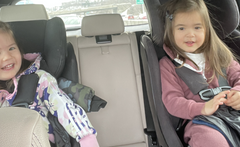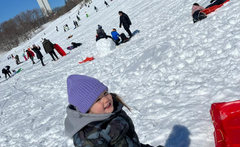If you're a parent, there’s no doubt that you've experienced (or are experiencing) the never-ending clean up cycle involved with raising kids, especially when they are toddlers.
After mealtime, clean-up involves wiping up my daughter’s face and hands, wiping the high chair, clearing the bib of food debris, emptying containers, washing dishes, and clearing the steamer and other cooking appliances.

After that’s finally done, I head into her play space where I immediately trip over her blocks and land on a pile of stuffed animals that she dumped from their bin earlier that day. At least it was stuffed animals today. I may not be as lucky tomorrow and I could land in a pile of Legos instead. Aaaaand the cycle repeats. Multiple times a day. It’s relentless and constant. And worst of all, it feels like you can never win or get ahead.

How We Cope
First of all, recognize that, while the house is a mess, we are not a mess. Ultimately, here's what matters: kids who are content and loved ones who feel supported. Are we having more happy moments than tantrums? Are we able to field the small wins and big losses together? If yes, then let’s recognize it as a victory! If not, don’t let your focus get thrown off course by the small things that hold relatively small significance in the bigger picture. And if you need extra help, there's no shame in asking and turning to your support system. You can even check out our resources page.
Second, change your expectations on what is acceptable. For me, this meant limiting the “big” clean up to only once or twice per day and instituting a rule where everyone, parent and child alike, chips in on the clean-up before leaving a room. Our guideline is that each person should put away at least 2 things before leaving a room. It helps to know that everyone is helping and that we’re all in this together.

How Cleaning Up Can Benefit Children
Did you know that when cleaning up becomes part of your child’s routine, it can positively impact them in several ways?
1. A clean-up routine prepares children
An obvious benefit is that it prepares children for expectations in various environments: at home, at school, and even at a friend’s or relative’s home. Cleaning up is part of many transitions in early childhood and there are expectations that children can carry out these tasks relatively independently. Practicing clean-up skills at home can help transfer these skills to other environments where cleaning up is also expected.
 Shop Jenny & Andy's Organic Wash Cloths
Shop Jenny & Andy's Organic Wash Cloths
2. You can embed learning opportunities
Clean-up time can also present many learning opportunities for young children, such as practicing turn-taking, matching, sorting, language, and fine motor skills.
For example, you can take turns putting objects into a bin; you can have your child find and put away one category of item (by colours or shapes, fruits, vegetables, etc.); you can give multi-tiered instructions (“give me the big, red block” and “first put away bunny, then put away puppy.”) This is also a great way to make clean-up into a fun game.

3. Teach temporal sequencing & planning skills
You can help improve your child's concept of time and planning with clean-up. When you instruct your child to clean up one activity before starting the next (i.e. “First clean up the blocks, then we can play cars.”), your child will be better able to anticipate future events and plan accordingly to make them happen.
Having to remember that they have to clean up before starting a different activity also exercises their working memory, an important executive functioning skill.

Shop Jenny & Andy's Organic Plush Rattle Cubes and Organic Plush Number Cubes
Stress Less About The Mess
We hope you learned a few tips and, at the very least, can rest easy in knowing you're not the only one. The struggle is real. But let this be your reminder that there are strategies to help you stress less about the mess!
Can you relate? Comment below with your coping strategies!



